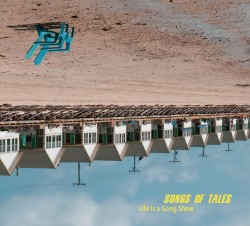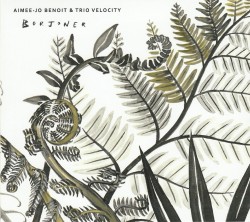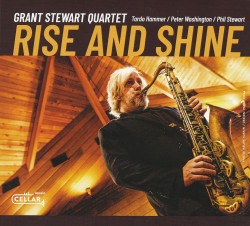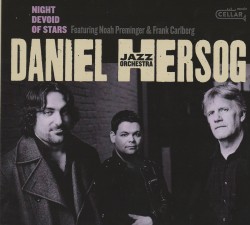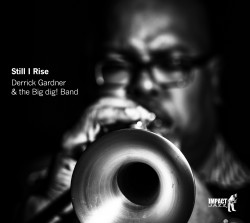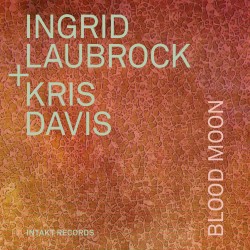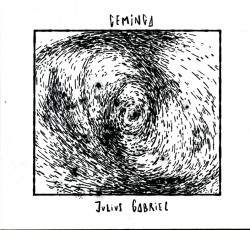 Once a rite of passage, solo outings for reed players have now become almost as commonplace in improvised music as jazz piano trio discs. At the same time, figuratively performing musically naked like that involves more than desire and technical skill. Cerebral planning as well as deciding which horn(s) to use, plus the suitability of the location’s acoustics are necessary as well. These new discs demonstrate how international reed players deal with the challenges.
Once a rite of passage, solo outings for reed players have now become almost as commonplace in improvised music as jazz piano trio discs. At the same time, figuratively performing musically naked like that involves more than desire and technical skill. Cerebral planning as well as deciding which horn(s) to use, plus the suitability of the location’s acoustics are necessary as well. These new discs demonstrate how international reed players deal with the challenges.
Performing on Geminga (Creative Sources CS 637 CD creativesourcesrec.com), German Julius Gabriel uses the spatial dimensions of an ancient chapel in Montemor-o-Novo, Portugal to expand his improvisation on soprano, tenor and baritone saxophones. That means that sometimes not only is he creating a thematic line and a vibrated secondary commentary but echoes from the chapel add a third aural element. Hear this at work on the extended Asteroids, as lively tones spill from his tenor saxophone augmented by a lower-pitch continuum and, following an upwards pitch shift, are joined by moderated trills that seem to vibrate from a second distant tenor saxophone. During ten tracks, Gabriel works his way to Epicycles, the circular-breathed soprano sax finale. Characterized by a surge from presto to prestissimo, his tone extensions and detours sputter and soar irregularly and broadly, but never interrupting the narrative flow. Briefer tracks are displays of blindingly fast key percussion or, on Cave Moans, just that, with gravelly razzing wails reflected by the spatial situation suggesting the noise of cave people shouting into the void. Other pieces are more focused. The Nerves finds layered baritone saxophone reed vibrations moving from nephritic honks to altissimo squeaks while displaying split-tone fluctuations. Meanwhile Juju’s Dream confirms that running through reed changes and affiliated chamber echoes with the harshest and most jagged tenor sax buzzes can climax with screaming multiphonics without abandoning a straightforward hidden melody. Jagged and smooth, sweet and sour, Walk Down’s andante exposition overlaps a jumpy theme to renal slurs and splatters before sliding to a smooth final interchange.
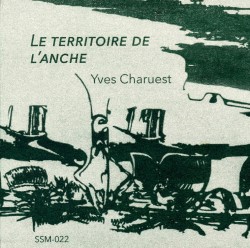
While Gabriel divides his reed attention three ways, Montreal’s Yves Charuest concentrates on the alto saxophone and spotlights the exploratory nature of his solos in the title of his CD, Le Territoire de l’Anche (Small Scale Music SSM-022 smallscalemusic.bandcamp.com). Concurrently his preoccupation is with high-pitched textures. Moving from a whisper to a scream on Arundo Donax, Adorno Don’t Ask, Charuest’s tongue-slapping variables and shrill whistles are dissected into terse peeps and screech passages at the edge of hearing using only stiff percussive breath. Subsequently, on Exquisite Corpus Callosum, he unearths slurry and slippery theme variations of temporal and timbral activity with a series of tongue stops, sliding from low pitches to elevated trills without upsetting andante motion. Charuest also uses barely there reed bites and tongue stabs to vibrate a secondary theme that is both spiky and stimulating. All together his tracks are terse, tart and throbbing and also expand the properties of the saxophone’s metal body, as exhalation digs textures from the body tube that owe nothing to reed or mouthpiece. He can also approximate mellow with connective slurs as on Rohrwurm. But his usual strategies involve moving timbres from shrill to shriller. Although these continuous eviscerated honks and piercing squeaks make the architecture of a tune like Interstitial Defect seem like a merry-go-round of musical motifs endlessly rotating, circular breathing leads to tone extensions not limitations. By the concluding Anémophile, as tongue slaps and whistles presage varied textures, he’s made a convincing case for the validity of brief, strident, metal-accented pitches as the basis for profoundly distinctive improvisations.
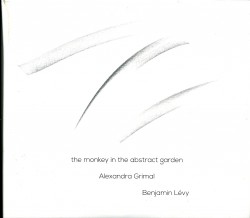
Dividing her sonic explorations in two, French soprano saxophonist Alexandra Grimal has put out the monkey in the abstract garden (Ovni OVB 0003 alexandragrimal.com) a two-CD set of which only Disc 1 is of concern. The second features her abstract vocalizing further altered and processed by Benjamin Lévy’s electronics. However, it’s her nine solo soprano saxophone variations on Ma that are fascinating. Dedicated to the intervals between and among notes, she projects a moderated tone, uses more pauses and stops than any of the other soloists here, in improvisations that are calm and dulcet without being cloying. With the tracks fluid, the sole dissident texture occurs at the beginning of Ma 5, coincidentally the shortest track, where an initial reed squeak soon settles into a horizontal patterning with an unbroken tone. More characteristic are improvisations where adagio peeps and trills curve into brief timbral emphasis, never losing exhilarating mellowness. Happily, to avoid sameness, the lengthiest instances of this allow for more development. Ma 8, for instance, emphasizes reed lowing and accelerating peeps as pauses lengthen between tongue flutters as the track slows down to largo. Eventually, as individual breaths lengthen each time they’re heard, a squeaking motif distinguishes this showcase from the other tracks. Ma 3 is also memorable, since the logically projected tongue stops and curlicue trills introduce a sequence where high and low pitches alternate so that it appears as if a ghostly second saxophonist is answering the primary reed projections.
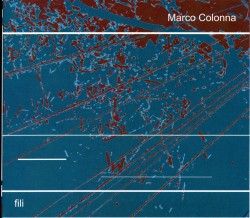
Solo reed revelations aren’t limited to saxophonists. A couple of clarinetists, Belgian Ben Bertrand and Italian Marco Colonna, are involved in similar programs, but with effects and electronics prominent as well. More animated and atonal of the two are the sounds on Colonna’s Fili (Niafunken nfk 007 niafunken.com). Playing clarinet and bass clarinet and using extended techniques and effects to overdub, dissect and multiply timbres, Colonna creates an unprecedented program. Like an actor in a one-person play, he takes all the parts himself and frequently interacts with his sonic Colonna’ssubterranean snorts from different instruments before culminating in a horizontal finale of a lone upturned trill.
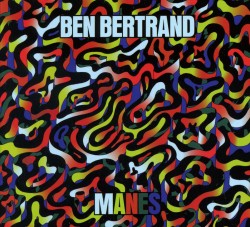 A divergence into differently defined textures, Belgian Ben Bertrand uses his bass clarinet and numerous effects machines to stretch his improvisations on Manes (Stroom/Les albums claus STRLP-038/LAC015 lesalbumclaus.bandcamp.com) so that they relate to techno and ambient music. Most distinctively, Incantation 3 defines this lower-case strategy. Reed respirations coupled with expressive sine waves create repetitive tones that vibrate rhythmically as clarion clarinet trills soar across the sound field for a deconstructed but measured exposition. Even as they blow airily these dissected trills retain their reed identity, but elsewhere the processing and extended techniques create passages that sound nothing like the tones a clarinet produces. Although overdubbed glissandi to create clarinet ensembles produce unique reed buzzes, the addition of the disembodied voice of Claire Vailler on the concluding The Manmaipo merely puts into bolder relief Bertrand’s achievement. Distinctively, this allows for the creation of altissimo and chalumeau register pitches to engage in a distinctive call and response between themselves.
A divergence into differently defined textures, Belgian Ben Bertrand uses his bass clarinet and numerous effects machines to stretch his improvisations on Manes (Stroom/Les albums claus STRLP-038/LAC015 lesalbumclaus.bandcamp.com) so that they relate to techno and ambient music. Most distinctively, Incantation 3 defines this lower-case strategy. Reed respirations coupled with expressive sine waves create repetitive tones that vibrate rhythmically as clarion clarinet trills soar across the sound field for a deconstructed but measured exposition. Even as they blow airily these dissected trills retain their reed identity, but elsewhere the processing and extended techniques create passages that sound nothing like the tones a clarinet produces. Although overdubbed glissandi to create clarinet ensembles produce unique reed buzzes, the addition of the disembodied voice of Claire Vailler on the concluding The Manmaipo merely puts into bolder relief Bertrand’s achievement. Distinctively, this allows for the creation of altissimo and chalumeau register pitches to engage in a distinctive call and response between themselves.
Once a rite of passage, solo outings for reed players have now become almost as commonplace in improvised music as jazz piano trio discs. At the same time, figuratively performing musically naked like that involves more than desire and technical skill. Cerebral planning as well as deciding which horn(s) to use, plus the suitability of the location’s acoustics are necessary as well. These new discs demonstrate how international reed players deal with the challenges.
Performing on Geminga (Creative Sources CS 637 CD creativesourcesrec.com), German Julius Gabriel uses the spatial dimensions of an ancient chapel in Montemor-o-Novo, Portugal to expand his improvisation on soprano, tenor and baritone saxophones. That means that sometimes not only is he creating a thematic line and a vibrated secondary commentary but echoes from the chapel add a third aural element. Hear this at work on the extended Asteroids, as lively tones spill from his tenor saxophone augmented by a lower-pitch continuum and, following an upwards pitch shift, are joined by moderated trills that seem to vibrate from a second distant tenor saxophone. During ten tracks, Gabriel works his way to Epicycles, the circular-breathed soprano sax finale. Characterized by a surge from presto to prestissimo, his tone extensions and detours sputter and soar irregularly and broadly, but never interrupting the narrative flow. Briefer tracks are displays of blindingly fast key percussion or, on Cave Moans, just that, with gravelly razzing wails reflected by the spatial situation suggesting the noise of cave people shouting into the void. Other pieces are more focused. The Nerves finds layered baritone saxophone reed vibrations moving from nephritic honks to altissimo squeaks while displaying split-tone fluctuations. Meanwhile Juju’s Dream confirms that running through reed changes and affiliated chamber echoes with the harshest and most jagged tenor sax buzzes can climax with screaming multiphonics without abandoning a straightforward hidden melody. Jagged and smooth, sweet and sour, Walk Down’s andante exposition overlaps a jumpy theme to renal slurs and splatters before sliding to a smooth final interchange.
While Gabriel divides his reed attention three ways, Montreal’s Yves Charuest concentrates on the alto saxophone and spotlights the exploratory nature of his solos in the title of his CD, Le Territoire de l’Anche (Small Scale Music SSM-022 smallscalemusic.bandcamp.com). Concurrently his preoccupation is with high-pitched textures. Moving from a whisper to a scream on Arundo Donax, Adorno Don’t Ask, Charuest’s tongue-slapping variables and shrill whistles are dissected into terse peeps and screech passages at the edge of hearing using only stiff percussive breath. Subsequently, on Exquisite Corpus Callosum, he unearths slurry and slippery theme variations of temporal and timbral activity with a series of tongue stops, sliding from low pitches to elevated trills without upsetting andante motion. Charuest also uses barely there reed bites and tongue stabs to vibrate a secondary theme that is both spiky and stimulating. All together his tracks are terse, tart and throbbing and also expand the properties of the saxophone’s metal body, as exhalation digs textures from the body tube that owe nothing to reed or mouthpiece. He can also approximate mellow with connective slurs as on Rohrwurm. But his usual strategies involve moving timbres from shrill to shriller. Although these continuous eviscerated honks and piercing squeaks make the architecture of a tune like Interstitial Defect seem like a merry-go-round of musical motifs endlessly rotating, circular breathing leads to tone extensions not limitations. By the concluding Anémophile, as tongue slaps and whistles presage varied textures, he’s made a convincing case for the validity of brief, strident, metal-accented pitches as the basis for profoundly distinctive improvisations.
Dividing her sonic explorations in two, French soprano saxophonist Alexandra Grimal has put out the monkey in the abstract garden (Ovni OVB 0003 alexandragrimal.com), a two-CD set of which only Disc 1 is of concern. The second features her abstract vocalizing further altered and processed by Benjamin Lévy’s electronics. However, it’s her nine solo soprano saxophone variations on Ma that are fascinating. Dedicated to the intervals between and among notes, she projects a moderated tone, uses more pauses and stops than any of the other soloists here, in improvisations that are calm and dulcet without being cloying. With the tracks fluid, the sole dissident texture occurs at the beginning of Ma 5, coincidentally the shortest track, where an initial reed squeak soon settles into a horizontal patterning with an unbroken tone. More characteristic are improvisations where adagio peeps and trills curve into brief timbral emphasis, never losing exhilarating mellowness. Happily, to avoid sameness, the lengthiest instances of this allow for more development. Ma 8, for instance, emphasizes reed lowing and accelerating peeps as pauses lengthen between tongue flutters as the track slows down to largo. Eventually, as individual breaths lengthen each time they’re heard, a squeaking motif distinguishes this showcase from the other tracks. Ma 3 is also memorable, since the logically projected tongue stops and curlicue trills introduce a sequence where high and low pitches alternate so that it appears as if a ghostly second saxophonist is answering the primary reed projections.
Solo reed revelations aren’t limited to saxophonists. A couple of clarinetists, Belgian Ben Bertrand and Italian Marco Colonna, are involved in similar programs, but with effects and electronics prominent as well. More animated and atonal of the two are the sounds on Colonna’s Fili (Niafunken nfk 007 niafunken.com). Playing clarinet and bass clarinet and using extended techniques and effects to overdub, dissect and multiply timbres, Colonna creates an unprecedented program. Like an actor in a one-person play, he takes all the parts himself and frequently interacts with his sonic doppelgangers. On Pane, for instance, a low-pitched tongue-slap beat is harmonized with treble reed lines until a single clarinet breaks out from the group to propel the klezmer-like theme forward with squeaks and splats until the line is so deemphasized that it fades away. Sos Berbos on the other hand plays with the rhythm created by key percussion and nasal exhalation, followed by an interlude from a ghostly clarinet trio whose output interacts as each reflects the other’s tones, climaxing with layered slurs from both high and low-pitched reeds. Sometimes, as on A Matita, the sequences fly by with kinetic multiphonics concentrated into stacked polyphony. Or, on Farina e Pianto, the exposition suddenly changes course as a solo clarinet sounds two calming rustic tones simultaneously as low-pitched reed pressure moves up the scale with intermittent squeals. Probably the track which best reflects Colonna’s multi-pronged reed strategy is Pietra. On it, soft-drink-bottle-cap-opening pops projected by tongue slaps presage a series of clarion bites and subterranean snorts from different instruments before culminating in a horizontal finale of a lone upturned trill.
A divergence into differently defined textures, Belgian Ben Bertrand uses his bass clarinet and numerous effects machines to stretch his improvisations on Manes (Stroom/Les albums claus STRLP-038/LAC015 lesalbumclaus.bandcamp.com) so that they relate to techno and ambient music. Most distinctively, Incantation 3 defines this lower-case strategy. Reed respirations coupled with expressive sine waves create repetitive tones that vibrate rhythmically as clarion clarinet trills soar across the sound field for a deconstructed but measured exposition. Even as they blow airily these dissected trills retain their reed identity, but elsewhere the processing and extended techniques create passages that sound nothing like the tones a clarinet produces. Although overdubbed glissandi to create clarinet ensembles produce unique reed buzzes, the addition of the disembodied voice of Claire Vailler on the concluding The Manmaipo merely puts into bolder relief Bertrand’s achievement. Distinctively, this allows for the creation of altissimo and chalumeau register pitches to engage in a distinctive call and response between themselves.
Electronics aside, each of these reed players has produced individual and exceptional solo works. As their varied programs demonstrate, there’s also still scope for others to engender particular responses to the solo reed challenge.
 Once a rite of passage, solo outings for reed players have now become almost as commonplace in improvised music as jazz piano trio discs. At the same time, figuratively performing musically naked like that involves more than desire and technical skill. Cerebral planning as well as deciding which horn(s) to use, plus the suitability of the location’s acoustics are necessary as well. These new discs demonstrate how international reed players deal with the challenges.
Once a rite of passage, solo outings for reed players have now become almost as commonplace in improvised music as jazz piano trio discs. At the same time, figuratively performing musically naked like that involves more than desire and technical skill. Cerebral planning as well as deciding which horn(s) to use, plus the suitability of the location’s acoustics are necessary as well. These new discs demonstrate how international reed players deal with the challenges. A divergence into differently defined textures, Belgian Ben Bertrand uses his bass clarinet and numerous effects machines to stretch his improvisations on Manes (Stroom/Les albums claus STRLP-038/LAC015 lesalbumclaus.bandcamp.com) so that they relate to techno and ambient music. Most distinctively, Incantation 3 defines this lower-case strategy. Reed respirations coupled with expressive sine waves create repetitive tones that vibrate rhythmically as clarion clarinet trills soar across the sound field for a deconstructed but measured exposition. Even as they blow airily these dissected trills retain their reed identity, but elsewhere the processing and extended techniques create passages that sound nothing like the tones a clarinet produces. Although overdubbed glissandi to create clarinet ensembles produce unique reed buzzes, the addition of the disembodied voice of Claire Vailler on the concluding The Manmaipo merely puts into bolder relief Bertrand’s achievement. Distinctively, this allows for the creation of altissimo and chalumeau register pitches to engage in a distinctive call and response between themselves.
A divergence into differently defined textures, Belgian Ben Bertrand uses his bass clarinet and numerous effects machines to stretch his improvisations on Manes (Stroom/Les albums claus STRLP-038/LAC015 lesalbumclaus.bandcamp.com) so that they relate to techno and ambient music. Most distinctively, Incantation 3 defines this lower-case strategy. Reed respirations coupled with expressive sine waves create repetitive tones that vibrate rhythmically as clarion clarinet trills soar across the sound field for a deconstructed but measured exposition. Even as they blow airily these dissected trills retain their reed identity, but elsewhere the processing and extended techniques create passages that sound nothing like the tones a clarinet produces. Although overdubbed glissandi to create clarinet ensembles produce unique reed buzzes, the addition of the disembodied voice of Claire Vailler on the concluding The Manmaipo merely puts into bolder relief Bertrand’s achievement. Distinctively, this allows for the creation of altissimo and chalumeau register pitches to engage in a distinctive call and response between themselves.




